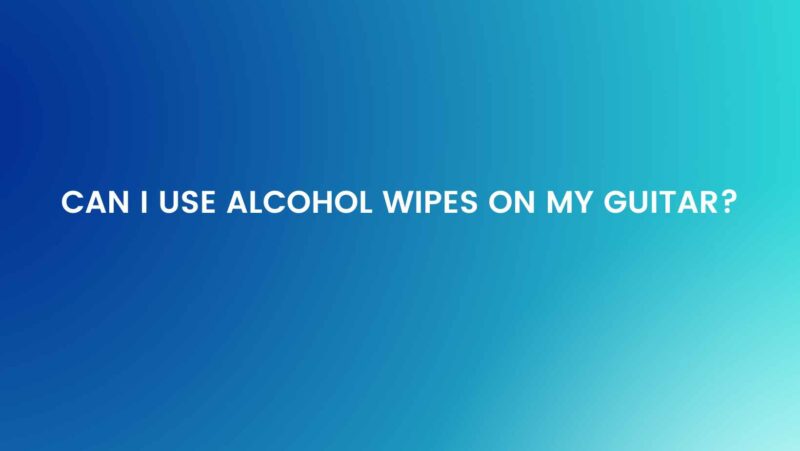Maintaining the cleanliness and hygiene of your guitar is essential not only for its aesthetics but also for its longevity and performance. However, when it comes to cleaning your instrument, many guitarists wonder if alcohol wipes are safe to use. In this article, we will explore the suitability of alcohol wipes for cleaning guitars and provide guidance on how to clean your instrument effectively and safely.
Understanding Guitar Materials
Guitars are crafted from various materials, including wood, metal, and plastic, each with its unique properties and susceptibilities. To determine whether alcohol wipes are suitable for your guitar, it’s crucial to understand the potential impact on different components:
- Wood: The body, neck, and fretboard of most guitars are made of wood, which can be sensitive to harsh chemicals or excessive moisture. Excessive use of alcohol can lead to issues such as drying out the wood or damaging the finish.
- Metal: Electric guitars, in particular, have metal components such as frets, tuning pegs, and bridges. Metal parts are less likely to be adversely affected by alcohol wipes, but care should be taken to avoid prolonged exposure, which may lead to discoloration or corrosion.
- Plastic and Electronics: Guitars may have plastic components like pickguards, control knobs, and electronic components in the case of electric guitars. Alcohol can potentially damage or degrade certain types of plastic, so caution is advised.
Effects of Alcohol Wipes on Guitars
The use of alcohol wipes on guitars can have both positive and negative effects, depending on the situation:
Positive Effects:
- Cleaning: Alcohol wipes can effectively remove fingerprints, dirt, grime, and sweat from the guitar’s surface, helping to maintain its appearance.
Negative Effects:
- Finish Damage: Alcohol wipes may strip away protective finishes, resulting in a dull or hazy appearance on glossy finishes.
- Wood Drying: Excessive use of alcohol on wooden parts can lead to drying out the wood, potentially causing cracks or other structural issues.
- Electronics and Plastics: Alcohol can damage or deteriorate certain types of plastics and electronic components.
Safe Cleaning and Maintenance
To ensure that you clean your guitar safely and effectively, follow these recommended cleaning and maintenance practices:
- Use a Soft Cloth: For routine cleaning, start with a soft, lint-free cloth to wipe away surface dust, fingerprints, and smudges. Avoid abrasive materials or paper towels that can scratch the finish.
- Specialized Guitar Cleaners: Consider using specialized guitar cleaning products formulated to clean and protect guitar finishes without causing damage to the wood or other components.
- Minimal Use of Alcohol Wipes: If you choose to use alcohol wipes, do so sparingly and primarily for non-wooden parts. Apply a small amount of alcohol to the cloth, not directly to the guitar.
- Avoid Electronics: When using alcohol wipes, be cautious around electronic components and plastic parts. Try to avoid direct contact with these areas to prevent potential damage.
- Test in a Hidden Area: If you’re uncertain about the compatibility of alcohol wipes with your guitar’s materials, test them in an inconspicuous area first.
Conclusion
In conclusion, the use of alcohol wipes on your guitar can be appropriate for certain cleaning tasks but should be approached with caution, particularly when dealing with wooden components and sensitive materials. It’s generally safer to use specialized guitar cleaning products designed to clean and protect your instrument without causing harm. By adopting safe cleaning practices and being mindful of your guitar’s materials, you can keep your instrument looking and playing its best for years to come.

